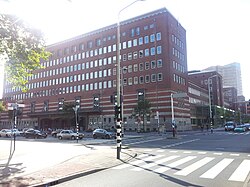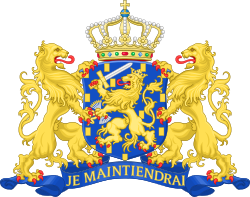| Dutch: Ministerie van Economische Zaken | |
 Ministry logo | |
 Building of the Ministry of Economic Affairs | |
| Department overview | |
|---|---|
| Formed | 17 August 1905 |
| Jurisdiction | Kingdom of the Netherlands |
| Headquarters | Bezuidenhoutseweg 73, The Hague, Netherlands |
| Annual budget | €5,2 billion (2018) [1] |
| Minister responsible | |
| Department executive |
|
| Website | Ministry of Economic Affairs |
The Ministry of Economic Affairs (Dutch : Ministerie van Economische Zaken; EZ) is the Netherlands' ministry responsible for international trade, commercial, industrial, investment, technology, space policy, as well as tourism.
Contents
The ministry was created in 1905 as the Ministry of Agriculture, Industry and Commerce and has had several name changes before it became the Ministry of Economic Affairs in 1946. In 2010 the Ministry of Agriculture, Nature and Food Quality was merged with the Ministry of Economic Affairs, which was renamed as the Ministry of Economic Affairs, Agriculture and Innovation. In 2012 the name was reverted as the Ministry of Economic Affairs but kept the responsibilities of the former Ministry of Agriculture. In 2017, the Ministry of Agriculture, Nature and Food Quality was reinstated but the Ministry of Economic Affairs took on several of the environmental policies portfolios from the Ministry of Infrastructure and the Environment, which was renamed Ministry of Infrastructure and Water Management. The Ministry of Economic Affairs was renamed Ministry of Economic Affairs and Climate Policy. The old name was restored in 2024, when the Ministry of Climate Policy and Green Growth was spun off.
The minister of economic affairs (Dutch : Minister van Economische Zaken) is the head of the ministry and a member of the Cabinet of the Netherlands. The current minister is Dirk Beljaarts, who has been in office since July 2024.
| This article is part of a series on |
| Politics of the Netherlands |
|---|
 |

